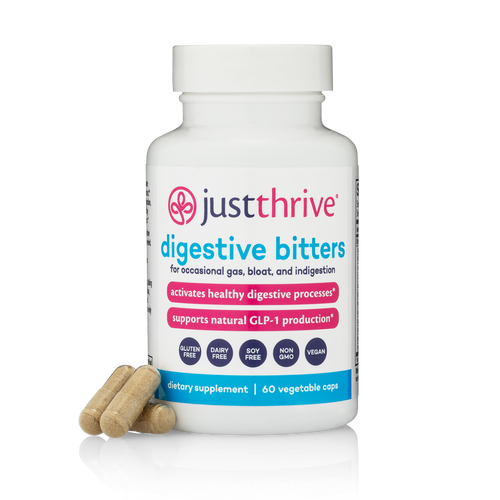If you wake up with a flat stomach and go to bed feeling six months pregnant…you may have SIBO.
If you feel bloated and gassy more often than not…you probably have SIBO.
If you’re practically chained to the bathroom with either diarrhea or constipation… chances are you have SIBO.
SIBO, or small intestinal bacterial overgrowth, affects millions of people…but not all of them know it. That’s because SIBO is often left undiagnosed, or is misdiagnosed as something else. And when doctors don’t pinpoint what’s really going on, it’s much tougher to fix.
Luckily, learning how to properly identify and address SIBO will support your best gut health and much more.
SIBO 101
Small intestinal bacterial overgrowth (SIBO) is just what it sounds like: An abnormal increase in the overall bacterial population in the small intestine—particularly with types of bacteria that aren't supposed to be in that part of your digestive tract.
Sometimes this happens because healthy, beneficial bacteria from the large intestine make their way to the small intestine and start colonizing there. Other times (less often), the bacteria that are supposed to be in the small intestine become imbalanced and overgrow.
Either way, that overgrowth sets your body on a problematic path. The extra bacteria feed on undigested food in your small intestine—especially sugary, starchy carbs. They transform those carbs into hydrogen gas. Some of that hydrogen gets ingested by other microbes in your gut, and they turn it into methane gas.
When this happens, your gut fills with extra hydrogen, methane, or both gases. And you can probably guess what happens next… gas attacks and painful bloating, usually followed by either diarrhea (if there’s more hydrogen) or constipation (if there’s more methane).


Know the 12 Signs of SIBO
SIBO gets missed or misdiagnosed so often because it can cause symptoms that may "look like" many other health concerns.[1] SIBO signs include:
- Gas
- Bloating
- Diarrhea
- Constipation
- Stomach pain
- Pale, extra-smelly poop
- Abdominal cramping
- Food intolerances (like lactose or gluten)
- Vitamin deficiencies
- Skin rashes
- Chronic disease (like fibromyalgia or diabetes)
- Fatigue and weakness
If you have any of these signs—and especially if you have more than one—you could be suffering with SIBO.
On top of that, if you’ve been diagnosed with either IBS (irritable bowel syndrome) or IBD (inflammatory bowel disease), you almost certainly have SIBO. In fact, up to 78% of people with IBS have SIBO.[2] And people with IBD are 9 times more likely to have SIBO than people without IBD.[3]
Getting Rid of SIBO
If you know—or even think—you have SIBO, there are some important steps you can follow to get your digestive tract back on track.
The first thing to do is stop feeding the overgrown bacteria. They live on sugar and carbs, so cutting out those foods will starve the bacteria.[4]
Along with things like cookies, cake, and alcohol, you’ll also have to stop eating (at least for a while) complex carbohydrates like beans, fruit, and whole grains to really cut off the SIBO supply lines.
Step two involves getting rid of the bad bacteria in your small intestine. Some people try antibiotics, but antibiotics are designed to kill off ALL your bacteria, both good and bad. Often after a round of antibiotics, your beneficial bacteria is slower to grow than your pathogenic bacteria, which means that if you use antibiotics for SIBIO, you might have two problems to fix.
You can also try natural antibiotic herbs like berberine and grapefruit seed extract, which are gentler on the beneficial bacteria you want to keep, however when your gut is imbalanced (as it is with SIBO), you'll need a long term solution.
The third step (the long-term solution) calls for balancing out your gut with probiotics (and maintaining that balance)…but this can be trickier than it sounds, and here's why:
Using the wrong probiotic supplements can actually make SIBO symptoms much worse!
Watch Out for the Wrong Probiotics
When you already have a bacterial overgrowth, the last thing you want to do is add more fuel to the fire. Unfortunately, that’s what happens when you have SIBO and decide to take most of the "common" probiotics. You see, the average probiotic product on store shelves can actually make your SIBO symptoms worse. This is the reason why many SIBO protocols involve stopping probiotics altogether.
That’s short-term thinking, though, because you can’t fully ease SIBO without proper gut support. And one of the best ways to support the health of your gut is to choose the right probiotics. Here's why...
With SIBO, a lot of the problematic overgrowth comes from probiotics in the Bifidobacterium and Lactobacillus genuses. Read most commercial probiotic labels and that’s exactly what you’ll see: Bifidobacterium and Lactobacillus probiotics.
With SIBO, when you take Bifidobacterium and Lactobacillus probiotics, they jump off the digestive tract train in your small intestine. They can add to the overgrowth that’s already happening, and that means more discomfort for you.
That’s why you need probiotics that have been shown to survive the harsh digestive environment, coast through the small intestine and arrive alive to the gut, where they balance and support your gut microbiome...so it can thrive!
Spore Probiotics Maintain Balance in the Small Intestine
Spore probiotics have tough protective "armor" shells that keep them safe from harsh environments. They can survive extreme temperatures, both hot and cold, and easily survive your stomach acid and digestive enzymes to make it all the way to your gut intact and alive.
When they reach their preferred destination—your intestines—spore probiotics emerge from their shells and get to work. They crowd out bad bacteria, work to support and promote many different types of beneficial bacteria, and they help maintain healthy balance in the gut microbiome.
That’s why spore probiotics are the right probiotics to support your health and address SIBO. They help optimize your bacterial populations while guarding against overgrowth. And by supporting the health of your gut microbiome, spore probiotics help drive a balanced immune response as well.
Just Thrive Probiotic Supports a Healthy Gut and a Happy You
When it comes to SIBO, your best course of action is to give your gut the power of spore-based probiotics to maintain proper balance and health.
The 4 proprietary spore strains in Just Thrive Probiotic are proven to quickly establish an environment that keeps your bacterial populations in check—crowding out the bad guys, and helping your good gut microbes grow and flourish.
Plus, only Just Thrive Probiotic contains the 4 most clinically studied strains that can survive the harsh environment of your stomach AND antibiotic therapy.
And if you’re feeling unsure about trying Just Thrive Probiotic, we can help with that.
EVERY Just Thrive purchase is covered by our Bottom of the Bottle, 100% money back guarantee.
So you can try Just Thrive Probiotic to see if it works for you… and we’re confident it will.
But if for any reason you don’t feel a difference, simply ask for a full product refund. Any time. Even if it’s been 2 months or 2 years. Even if the bottle is empty! You’ll get your money back any time, no matter what.
>> Try Just Thrive Probiotic, 100% RISK FREE, and save 30% on your first month’s subscription with code SUB30.
Sources
- Dukowicz AC, Lacy BE, Levine GM. Small intestinal bacterial overgrowth: a comprehensive review. Gastroenterol Hepatol (N Y). 2007;3(2):112-122.
- Ghoshal UC, Srivastava D. Irritable bowel syndrome and small intestinal bacterial overgrowth: meaningful association or unnecessary hype. World J Gastroenterol. 2014;20(10):2482-2491. doi:10.3748/wjg.v20.i10.2482
- Shah A, Morrison M, Burger D, et al. Systematic review with meta-analysis: the prevalence of small intestinal bacterial overgrowth in inflammatory bowel disease. Aliment Pharmacol Ther. 2019;49(6):624-635. doi:10.1111/apt.15133
- Saffouri GB, Shields-Cutler RR, Chen J, et al. Small intestinal microbial dysbiosis underlies symptoms associated with functional gastrointestinal disorders. Nat Commun. 2019;10(1):2012. Published 2019 May 1. doi:10.1038/s41467-019-09964-7














